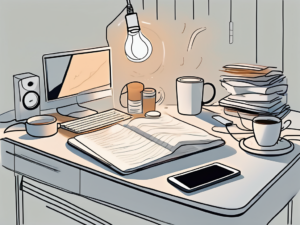Are you finding it difficult to concentrate during finals? Don’t worry, you’re not alone. Many students struggle with maintaining focus during this crucial time. The pressure of finals can feel overwhelming, but understanding the reasons behind this challenge can help you overcome it. In this article, we will delve into the psychological and physical stressors that can hinder your focus during exam periods. We will also explore the distractions that commonly arise and discuss the vital role of time management, nutrition, and sleep in maintaining a sharp mind.
Understanding the Pressure of Finals
The Psychological Impact of Finals
Finals are a culmination of weeks or months of study and preparation, and the weight of their importance can impact your mental well-being. It’s normal to feel anxious, stressed, or overwhelmed during this time. The fear of failure, the desire to excel, and the uncertainty of what lies ahead can all contribute to a lack of focus. It’s essential to recognize these emotions and find healthy ways to manage them.
One common psychological impact of finals is imposter syndrome, where students doubt their abilities and feel like they don’t belong in their academic environment. This feeling of inadequacy can be heightened during exam periods, leading to increased stress and self-doubt. Seeking support from peers, professors, or mental health professionals can help combat these negative thoughts and build confidence.
The Physical Stressors of Exam Periods
It’s not just the mind that experiences stress during finals; the body takes a toll as well. Sleep deprivation, irregular eating habits, and limited physical activity are common side effects of intense studying. These factors can diminish your ability to concentrate, leaving you feeling fatigued and unfocused. It’s important to prioritize self-care and make sure you are addressing your physical needs during this demanding time.
In addition to the physical stressors, prolonged sitting during study sessions and exams can lead to musculoskeletal issues such as back pain, neck stiffness, and headaches. Taking short breaks to stretch, walk around, and practice relaxation techniques can help alleviate these discomforts and improve your overall well-being. Remember, your physical health is just as important as your mental well-being during finals week.
Identifying Distractions During Finals
Common External Distractions
External distractions can be a significant hindrance to your focus during finals. Noisy environments, technology interruptions, and social obligations can all divert your attention away from your studies. It’s crucial to create a conducive study environment, free from unnecessary disturbances. Consider finding a quiet space, turning off notifications on your devices, and communicating your need for solitude to those around you.
Furthermore, another common external distraction that students often face during finals is the temptation to multitask. While it may seem efficient to juggle multiple tasks simultaneously, research shows that multitasking can actually decrease productivity and lead to more errors. It’s essential to prioritize your study sessions and focus on one task at a time to optimize your learning and retention.
Internal Distractions and Their Effects
Internal distractions, such as intrusive thoughts or excessive self-criticism, are just as detrimental to your focus. Negative self-talk, worrying about past performance, or fixating on the outcome of your exams can consume valuable mental energy. Practice mindfulness techniques to acknowledge these thoughts without judgment and bring yourself back to the present moment. Remember, focusing on the present is the key to better outcomes in the future.
In addition to intrusive thoughts, another internal distraction that can impact your performance during finals is lack of self-care. Neglecting your physical and mental well-being, such as skipping meals, not getting enough sleep, or avoiding exercise, can lead to fatigue and decreased cognitive function. It’s important to prioritize self-care practices during this stressful time, including maintaining a healthy diet, getting regular exercise, and ensuring an adequate amount of rest to support your academic performance.
The Role of Time Management in Focus
Procrastination and Its Impact on Focus
We’ve all been guilty of procrastination at some point. However, during finals, this habit can severely impede your ability to concentrate. Procrastination not only adds unnecessary stress but also takes away precious study time. Recognize the causes of your procrastination and find strategies to overcome it, such as breaking tasks into smaller, manageable parts or using time-blocking techniques.
Understanding the psychology behind procrastination can be key to combatting this common issue. Procrastination often stems from a fear of failure, perfectionism, or feeling overwhelmed by the task at hand. By addressing these underlying emotions and thoughts, you can develop a healthier approach to time management and focus. Additionally, practicing mindfulness techniques, such as deep breathing or meditation, can help center your mind and reduce the urge to procrastinate.
The Importance of Scheduling and Routine
Creating a well-structured schedule and sticking to it can do wonders for your focus during finals. A routine helps your mind and body adjust to regular study sessions, making it easier to maintain concentration. Organize your study materials, prioritize tasks, and allocate time for breaks. A well-balanced schedule allows for both productive studying and rejuvenating self-care activities.
Furthermore, incorporating variety into your study routine can prevent burnout and enhance your overall focus. Consider alternating between different subjects or study methods to keep your brain engaged and motivated. Experiment with study environments, such as libraries, cafes, or outdoor spaces, to find what works best for you. By keeping your study routine dynamic and adaptive, you can optimize your focus and retention of information.
Nutrition and Focus During Finals
The Impact of Diet on Concentration
During stressful times like finals, it’s tempting to rely on quick, unhealthy snacks or skip meals altogether. However, proper nutrition is crucial for maintaining focus. A balanced diet rich in fruits, vegetables, lean proteins, and whole grains provides the necessary nutrients for optimal brain function. Avoid excessive caffeine and sugary foods, as they can lead to energy crashes and hinder your ability to concentrate.
Additionally, incorporating foods high in omega-3 fatty acids, such as salmon, walnuts, and flaxseeds, can help improve cognitive function and enhance memory retention. These essential fatty acids are known to support brain health and may boost your ability to retain information during study sessions.
Hydration and Its Role in Maintaining Focus
Water is the elixir of life, and it plays a vital role in cognitive function. Dehydration can lead to fatigue, headaches, and poor concentration. Stay hydrated by drinking plenty of water throughout the day. Carry a water bottle with you and make it a habit to take regular sips to keep your mind sharp and focused.
In addition to water, herbal teas like green tea can also contribute to improved focus and concentration. Green tea contains L-theanine, an amino acid that has been shown to increase alpha wave activity in the brain, promoting a state of relaxed alertness. This can be particularly beneficial during long study sessions, helping you stay calm and focused under pressure.
Importance of Sleep During Finals
Understanding the Sleep-Focus Connection
Sleep is not a luxury; it is a necessity, especially during finals. Proper sleep is essential for memory consolidation, learning, and cognitive performance. Pulling all-nighters may seem like a solution, but it often leads to diminished focus and impaired memory retention. Aim for seven to eight hours of quality sleep each night to ensure your brain is well-rested and ready to tackle the challenges ahead.
During sleep, the brain goes through various stages that are crucial for different functions. Rapid Eye Movement (REM) sleep, for example, is linked to memory consolidation and problem-solving skills. Non-REM sleep, on the other hand, is essential for physical restoration and growth. By getting enough sleep, you allow your brain to cycle through these stages properly, enhancing your overall cognitive abilities and performance.
Tips for Better Sleep During Exam Periods
Establish a bedtime routine that promotes relaxation and signals to your body that it’s time to wind down. Avoid stimulating activities or screens before bed, and create a sleep-friendly environment by keeping your bedroom cool, dark, and quiet. If you find it challenging to fall asleep due to racing thoughts, consider journaling or practicing relaxation techniques such as deep breathing or meditation. Your body and mind will thank you for prioritizing sleep.
Additionally, incorporating regular exercise into your routine can help improve the quality of your sleep. Physical activity not only tires out your body, making it easier to fall asleep, but it also releases endorphins that reduce stress and anxiety, common culprits of sleep disturbances during exam periods. Just make sure to schedule your workouts earlier in the day to avoid any interference with your bedtime.
Remember, it’s essential to approach finals with a healthy mindset and take care of yourself. By understanding the psychological and physical stressors, identifying distractions, managing time effectively, nourishing your body with proper nutrition, and prioritizing sleep, you’ll set yourself up for success. Embrace the challenges that finals bring, and seize the opportunity to showcase your knowledge and abilities. Good luck!



